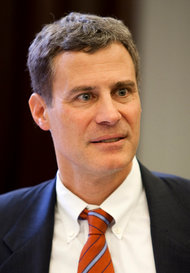 Joshua Roberts/Bloomberg NewsAlan B. Krueger
Joshua Roberts/Bloomberg NewsAlan B. Krueger
What Mitt Romney a few days ago called “the bitter politics of envy,” President Obama’s chief economic adviser instead described Thursday as the basic economics of unequal opportunity.
As long as the rich keep getting richer and the middle class languishes, he said, the economy as a whole will suffer.
Alan B. Krueger, the chairman of the White House’s Council of Economic Advisers and an accomplished labor economist, presented chapter and verse of the administration’s understanding of income inequality, economic opportunity and the fortunes of the middle class in a speech to the Center for American Progress, a research group closely aligned with the administration’s viewpoint.
His theme: “Rising inequality has been bad for the U.S. economy.”
It is a thought that Mr. Obama has incorporated into his core economic message, notably in his speech in Osawatomie, Kan., and it is an argument that will very likely echo again through the State of the Union address on Jan. 24.
But rarely is the economic evidence for the administration’s now-familiar talking points presented in such detail. Mr. Krueger’s 10-page text was more pedantic than polemic, less a stump speech than a statistical one. (Mr. Krueger, while a professor at Princeton, was a contributor in the past to the Economic Scene column of The New York Times and to this blog.)
He called the emerging data on income distribution “mind boggling.” And he presented a case, as Mr. Obama has done recently, that the trend is only going to become more pronounced in the years ahead, making it harder and harder for poor and middle class people to move up the economic ladder. And that, he argued, would be bad for economic growth.
A few of his key points:
“I could see why someone could support tax cuts for top income earners if they had materially benefited the U.S. economy, but the macro evidence is clear that the economy did not perform better after last decade’s tax cuts than it did after taxes were increased on top earners in the early 1990s.”
“Rising inequality and slow income growth for the vast middle class have harmed the U.S. economy — namely, by encouraging many families to borrow beyond their means to try to maintain their consumption, and by reducing aggregate consumption.”
“If another $1.1 trillion had been earned by the bottom 99 percent instead of the top 1 percent, annual consumption would be about $440 billion higher. This would be a 5 percent boost.” (He added that there were caveats to this calculation.)
It follows that “the economy would be in better shape and aggregate demand would be stronger if the size of the middle class had not dwindled as a result of rising inequality.”
The policy prescriptions that he said flow from this analysis are not surprising: they are the core of the Obama election-year agenda, and include carrying out the new health care law, further extending the payroll tax cut, maintaining strong regulations on the financial sector and ending “unnecessary tax cuts for the wealthy.”
So whatever the economic evidence Mr. Krueger has assembled, it might not be a practical plan to put these words of his on a bumper sticker: “Support for equality of opportunity should be a nonpartisan issue.”
Nor is Mr. Romney, who can recite his own economic rationale for moving the country in the opposite direction, likely to abandon his “envy” line anytime soon.
Article source: http://feeds.nytimes.com/click.phdo?i=c1abae688107c4672d752a2b335bac42